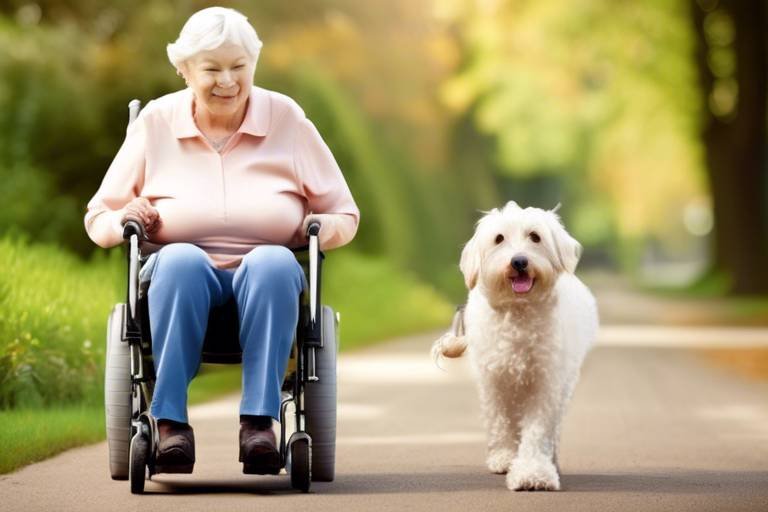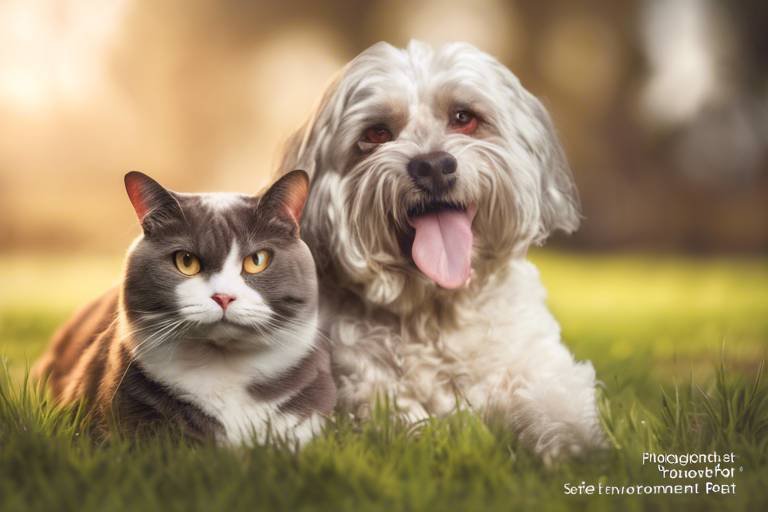The Best Health Supplements for Senior Pets
As our furry companions grow older, their needs evolve, and it becomes essential to pay close attention to their health and well-being. Just like us, senior pets experience changes in their bodies that can affect their energy levels, mobility, and overall health. This article explores essential health supplements that can enhance the well-being of senior pets, addressing their unique nutritional needs and promoting longevity and vitality in their golden years.
Imagine your pet as a wise old sage, filled with stories and experiences but perhaps moving a bit slower. These golden years can be filled with joy, but they can also bring challenges. The right supplements can make a world of difference, helping your beloved pet enjoy their twilight years with more energy and less discomfort. So, what are the best health supplements for senior pets? Let’s dive in!
As pets age, their nutritional requirements change significantly. Understanding these changes is crucial for selecting the right supplements to support their health and overall quality of life. Just like how we might crave different foods as we age, senior pets may require specific nutrients to stay healthy. It’s not just about feeding them; it’s about feeding them right!
For instance, senior pets often need more fiber to aid digestion and prevent obesity, while their protein needs may decrease. Additionally, their bodies may not absorb nutrients as efficiently, making it vital to choose high-quality supplements that cater to their unique needs. This is where a little research and guidance from a veterinarian can go a long way in ensuring your pet is getting the nutrition they deserve.
Senior pets often face various health challenges, including arthritis, obesity, and dental problems. Identifying these issues can help in choosing appropriate supplements to alleviate their symptoms. For example, if your pet is struggling to jump onto the couch or seems stiff after a nap, it might be a sign of joint issues. On the other hand, if they are less active and gaining weight, it could indicate a need for dietary adjustments.
Understanding these common health issues can empower pet owners to take proactive steps. Supplements can play a pivotal role in managing these conditions. Here are some common health issues and the type of supplements that may help:
| Health Issue | Recommended Supplements |
|---|---|
| Arthritis | Glucosamine, Chondroitin, Omega-3 Fatty Acids |
| Obesity | Fiber, Probiotics |
| Dental Problems | Dental Chews, Omega-3 Fatty Acids |
Joint health is a significant concern for aging pets. Supplements containing glucosamine and chondroitin can help maintain mobility and reduce discomfort associated with joint degeneration. Think of these supplements as a lubricant for your pet’s joints, helping them move more freely and comfortably.
Omega-3 fatty acids are known for their anti-inflammatory properties. Incorporating these supplements can improve joint health and support cognitive function in senior pets. It's like giving your pet a little boost of energy and clarity, helping them stay active and engaged with their surroundings.
Selecting a joint supplement requires careful consideration of ingredients and formulations. Consulting with a veterinarian can guide pet owners in making the best choice for their pets' needs. It’s essential to look for reputable brands and ensure the supplements are specifically designed for pets. After all, you wouldn’t want to give your furry friend anything less than the best!
Vitamins and antioxidants play a vital role in boosting the immune system and combating oxidative stress in senior pets, promoting overall health and vitality. These nutrients are like the superheroes of nutrition, fighting off the villains of aging and keeping your pet feeling young at heart.
Maintaining digestive health is essential for senior pets. Probiotics can aid in digestion and improve gut health, leading to better nutrient absorption and overall wellness. Think of probiotics as the friendly bacteria that help your pet's tummy stay happy and healthy!
Fiber is crucial for senior pets as it aids in digestion and helps prevent obesity. Understanding the right fiber sources can enhance their dietary regimen. Foods rich in fiber, such as pumpkin or sweet potatoes, can be great additions to their diet. It’s all about keeping things flowing smoothly!
Proper hydration is vital for senior pets. Ensuring they have access to fresh water and considering electrolyte supplements can support their kidney function and overall health. Just like we need to stay hydrated, our pets do too, especially as they age.
1. What are the most important supplements for senior pets?
The most important supplements typically include joint health supplements (like glucosamine), omega-3 fatty acids, vitamins, and probiotics.
2. How do I know if my pet needs supplements?
If your pet shows signs of aging, such as decreased mobility, weight gain, or digestive issues, it might be time to consider supplements. Always consult with a veterinarian for personalized advice.
3. Are there any risks associated with giving supplements to pets?
Yes, over-supplementation can lead to health issues. It's crucial to follow recommended dosages and consult your vet to avoid any adverse effects.

Understanding Senior Pet Nutrition
As our furry companions age, their bodies undergo a variety of changes that directly impact their nutritional needs. Just like humans, senior pets experience shifts in metabolism, energy levels, and overall health. This means that what worked for them in their younger years may not be suitable anymore. Understanding these changes is crucial for pet owners who want to ensure their beloved animals enjoy a healthy and vibrant life.
One of the most significant changes in senior pets is their decreased energy requirements. As pets age, they tend to become less active, which can lead to weight gain if their food intake isn't adjusted accordingly. This is where caloric intake becomes essential. Senior pets typically require fewer calories, but they still need high-quality nutrients to maintain their health. Think of it like trading in a sports car for a fuel-efficient sedan; the goal is to keep your pet running smoothly without unnecessary strain on their system.
Moreover, senior pets often face a decline in their ability to absorb nutrients effectively. This means that even if they are eating a balanced diet, they may not be getting all the vitamins and minerals they need. High-quality protein becomes increasingly important as it helps maintain muscle mass, which can diminish with age. Look for pet foods that list real meat as the first ingredient, ensuring that your pet gets the best possible nutrition.
Another critical aspect of senior pet nutrition is hydration. Older pets may not drink as much water as they should, leading to dehydration, which can exacerbate health problems. It's essential to encourage regular water intake and consider incorporating wet food into their diet, which can help boost hydration levels. You might think of it as adding a splash of flavor to a dry sponge—suddenly, it’s much more appealing!
In addition to these dietary changes, supplements can play a pivotal role in enhancing the health of senior pets. Nutritional supplements such as vitamins, minerals, and fatty acids can help fill in the gaps that may arise from an aging digestive system. For instance, Omega-3 fatty acids are known for their anti-inflammatory properties, which can be beneficial for joint health and cognitive function. When selecting supplements, always consult with a veterinarian to tailor a regimen that suits your pet's specific needs.
To sum it up, understanding senior pet nutrition is about recognizing the unique challenges that come with aging. By adjusting their diet to meet these changes—focusing on quality over quantity, ensuring hydration, and incorporating the right supplements—you can help your senior pet thrive during their golden years. After all, a well-nourished pet is a happy pet!

Common Health Issues in Senior Pets
As our furry companions age, they often face a variety of health challenges that can significantly affect their quality of life. Just like humans, senior pets experience changes in their bodies that can lead to a host of issues. Understanding these common health problems is essential for pet owners who wish to provide the best care for their aging friends. Some of the most prevalent issues include arthritis, obesity, and dental problems.
Arthritis is perhaps one of the most common ailments in senior pets, particularly in dogs and cats. This degenerative joint disease can lead to pain, stiffness, and decreased mobility. Imagine how difficult it is for your pet to jump onto the couch or take a leisurely stroll in the park when their joints are inflamed and sore. It’s heartbreaking to see them struggle, but recognizing the signs early can help you take action.
Next on the list is obesity, a growing concern for pets of all ages, but especially for seniors. As pets age, their metabolism slows down, and they may become less active. This decrease in activity, combined with a less-than-ideal diet, can lead to weight gain. Excess weight not only puts additional strain on their joints but can also contribute to other serious health issues such as diabetes and heart disease. A balanced diet and regular exercise are crucial in combating obesity in senior pets.
Dental problems are another common issue that can plague senior pets. Just like us, pets can suffer from periodontal disease, tooth decay, and other dental issues as they age. Poor dental health can lead to pain, difficulty eating, and even systemic health problems if bacteria enter the bloodstream. Regular dental check-ups and good oral hygiene practices are vital to maintaining your pet's overall health.
In addition to these issues, senior pets may also face a variety of other health challenges such as:
- Kidney disease: Common in older pets, this condition can lead to severe health complications if not managed properly.
- Cognitive dysfunction: Similar to dementia in humans, pets can experience confusion and memory loss as they age.
- Vision and hearing loss: Many senior pets experience a decline in their senses, which can affect their quality of life.
Recognizing these common health issues is the first step in ensuring your senior pet lives a long, healthy, and happy life. Regular veterinary check-ups and being vigilant about any changes in behavior or physical condition can make a world of difference. By staying informed and proactive, you can help your furry friend navigate their golden years with grace and comfort.
Q: How can I tell if my senior pet is in pain?
A: Look for signs such as difficulty moving, reluctance to play, changes in appetite, or unusual vocalizations. If you notice any of these signs, consult your veterinarian for guidance.
Q: What are the best dietary changes for senior pets?
A: Focus on a balanced diet rich in high-quality proteins, healthy fats, and fiber. Consult your vet for specific recommendations based on your pet's health status.
Q: How often should senior pets see the vet?
A: Ideally, senior pets should have veterinary check-ups at least every six months. This allows for early detection of any potential health issues.
Joint Health Supplements
As our beloved pets age, their joints often become a major concern, much like how our knees might creak after a long day of activity. The wear and tear on their joints can lead to discomfort and decreased mobility, making it crucial for pet owners to consider . These supplements are specifically designed to support the structural integrity of joints and to alleviate the discomfort that comes with conditions like arthritis.
One of the most popular ingredients in joint supplements is glucosamine. This natural compound is found in the cartilage of joints and is essential for maintaining their health. When combined with chondroitin, another vital component that helps retain water in the cartilage, these supplements can work wonders. They not only aid in lubricating the joints but also help in rebuilding cartilage that may have been damaged over the years. Think of glucosamine and chondroitin as the dynamic duo that keeps your pet's joints moving smoothly!
It's worth noting that some joint health supplements also include additional ingredients such as MSM (Methylsulfonylmethane), which is known for its anti-inflammatory properties. This means that not only are we working to repair the joints, but we are also actively reducing inflammation that can lead to pain. Hyaluronic acid is another ingredient that has gained popularity for its ability to improve joint lubrication and shock absorption. Together, these components create a comprehensive approach to joint health.
When selecting a joint supplement, it’s essential to consider the formulation carefully. Not all supplements are created equal, and some may contain fillers or low-quality ingredients. A good practice is to look for products that have been tested for quality and efficacy. Always consult with your veterinarian before starting any new supplement regimen. They can provide personalized recommendations based on your pet's specific health needs and conditions.
In addition to supplements, incorporating certain lifestyle changes can also support joint health. Regular, low-impact exercise, such as swimming or gentle walks, can help maintain mobility without putting too much strain on the joints. Moreover, maintaining a healthy weight is crucial since excess weight can exacerbate joint issues. A combination of the right supplements and lifestyle adjustments can lead to a happier, more active senior pet.
In summary, joint health supplements can be a game-changer for senior pets. By choosing high-quality products that include glucosamine, chondroitin, and other beneficial ingredients, pet owners can help their furry friends enjoy their golden years with less pain and more mobility. Remember, a proactive approach to joint health can make all the difference!
Benefits of Omega-3 Fatty Acids
When it comes to keeping our senior pets vibrant and healthy, Omega-3 fatty acids are like the superheroes of the supplement world. These essential fats are not just a trendy buzzword; they are packed with benefits that can significantly enhance your furry friend's quality of life. Imagine Omega-3s as a soothing balm for inflammation, a gentle hug for the joints, and a brain-boosting treat for cognitive function. Sounds amazing, right?
One of the primary benefits of Omega-3 fatty acids is their ability to reduce inflammation. Inflammation can be a major culprit behind many health issues in senior pets, including joint pain and skin problems. By incorporating Omega-3s into their diet, you're essentially giving your pet a fighting chance against these discomforts. Studies have shown that these fatty acids can help alleviate symptoms of arthritis, making it easier for your beloved companion to jump, run, and play—activities that are crucial for their mental and physical well-being.
But that’s not all! Omega-3 fatty acids also play a vital role in supporting cognitive function. As our pets age, their brains can start to show signs of decline, similar to what we experience as humans. Omega-3s, particularly DHA (docosahexaenoic acid), are known to promote brain health. Think of it as giving your pet’s brain a refreshing boost, helping them stay sharp and alert, which is essential for their overall happiness.
Moreover, Omega-3s can also improve skin and coat health. Senior pets often suffer from dry, flaky skin or dull coats. By adding Omega-3 fatty acids to their diet, you can help restore their skin's moisture and enhance the shine of their fur. A healthy coat is not just about looks; it's also a sign of good health and can help protect against various skin conditions.
Here’s a quick overview of some key benefits of Omega-3 fatty acids for senior pets:
- Reduces inflammation: Helps alleviate joint pain and discomfort.
- Supports cognitive function: Enhances brain health and keeps your pet sharp.
- Improves skin and coat health: Restores moisture and shine to their fur.
- Boosts heart health: Helps maintain a healthy heart and circulatory system.
Incorporating Omega-3 fatty acids into your senior pet's diet can be as simple as choosing high-quality fish oil supplements or opting for pet foods enriched with these essential fats. However, it's always best to consult with your veterinarian before introducing any new supplements to ensure they fit well with your pet's specific health needs.
In conclusion, Omega-3 fatty acids are not just another supplement; they are a lifeline for senior pets, offering a myriad of benefits that can enhance their quality of life significantly. By making this simple addition to their diet, you're not only promoting their physical health but also supporting their mental well-being, making their golden years truly golden.
Choosing the Right Joint Supplement
When it comes to selecting the right joint supplement for your senior pet, the options can feel overwhelming. With a plethora of products on the market, how do you ensure that you're making the best choice for your furry friend? First and foremost, it’s essential to look at the ingredients. Not all joint supplements are created equal, and some may contain fillers or low-quality components that do little to support your pet's health.
One of the key ingredients you should look for is glucosamine. This naturally occurring compound helps maintain cartilage and joint health. Alongside glucosamine, chondroitin sulfate is another vital ingredient that can promote joint lubrication and elasticity. Together, these two components work synergistically to reduce joint pain and improve mobility.
Additionally, consider the inclusion of MSM (methylsulfonylmethane), which is known for its anti-inflammatory properties. This can be particularly beneficial for pets suffering from arthritis or other joint-related issues. When evaluating a product, check for Omega-3 fatty acids as well, because they can help reduce inflammation and support overall joint health.
Another critical aspect to consider is the form of the supplement. Joint supplements come in various forms, including tablets, chews, and liquids. Many pets prefer chews because they taste good and are easy to consume. If your pet is picky, a flavored chewable might be the best option to ensure they actually take their supplement. However, some pets may require a liquid form for easier administration, especially if they have dental issues that make chewing difficult.
It's also wise to look for supplements that are backed by research. Some brands invest in clinical trials to demonstrate the effectiveness of their products. A reputable brand will often provide this information on their packaging or website. Additionally, consider products that have been certified by third-party organizations, as this can further validate their quality and efficacy.
Before making a purchase, consulting with your veterinarian is crucial. They can provide personalized recommendations based on your pet's specific health needs and conditions. Your vet may also suggest a combination of supplements that can work together to improve your senior pet's joint health.
Finally, keep an eye on your pet's response to the supplement. It may take time to notice improvements, and it’s important to be patient. Monitor their mobility and overall behavior, and don’t hesitate to reach out to your vet if you have any concerns. Remember, the goal is to enhance your pet's quality of life, helping them enjoy their golden years with vigor and vitality.
Q: How long does it take to see results from joint supplements?
A: Results can vary, but many pet owners notice improvements within 4 to 6 weeks of consistent use.
Q: Can I give my senior pet human joint supplements?
A: It's best to avoid human supplements unless specifically advised by a veterinarian, as some ingredients can be harmful to pets.
Q: Are there any side effects associated with joint supplements?
A: Most joint supplements are safe, but some pets may experience mild digestive upset. Always consult your vet if you notice any adverse reactions.
Vitamins and Antioxidants
As our beloved pets age, their bodies undergo various changes that can impact their overall health and vitality. One of the most crucial aspects of maintaining their well-being is ensuring they receive an adequate supply of vitamins and antioxidants. These essential nutrients play a pivotal role in enhancing the immune system, combating oxidative stress, and promoting longevity in senior pets. Think of vitamins and antioxidants as the superheroes of your pet's diet, fighting off the villains of aging and disease.
Vitamins such as A, C, and E are particularly important for senior pets. Vitamin A supports vision and skin health, while Vitamin C acts as a powerful antioxidant, helping to neutralize free radicals that can cause cellular damage. Vitamin E, another potent antioxidant, works hand-in-hand with Vitamin C to protect cells from oxidative stress. Together, these vitamins create a robust defense system that can help your pet thrive well into their golden years.
Antioxidants, in general, are vital for neutralizing harmful compounds that can accumulate in your pet's body as they age. By incorporating a diet rich in antioxidants, you can help mitigate the effects of aging and support your pet's overall health. Foods like blueberries, spinach, and sweet potatoes are excellent sources of these beneficial compounds. However, sometimes, a regular diet might not provide enough of these nutrients, and that's where supplements come into play.
When considering supplements, it's essential to look for those specifically formulated for senior pets. Many of these products combine various vitamins and antioxidants to create a comprehensive health boost. For instance, a quality supplement might include:
- Vitamin C: For immune support and skin health.
- Vitamin E: To protect against oxidative stress.
- Beta-carotene: A precursor to Vitamin A that supports vision and skin health.
- Selenium: An essential mineral that works synergistically with vitamins.
It's important to remember that while supplements can be beneficial, they should not replace a balanced diet. Always consult with your veterinarian before introducing new supplements to ensure they align with your pet's specific health needs. After all, just like we wouldn't want to give our pets a one-size-fits-all solution, we want to tailor their nutrition to suit their unique needs.
In summary, ensuring your senior pet receives adequate vitamins and antioxidants is crucial for maintaining their health and vitality. By prioritizing these nutrients, you can help your furry friend navigate the challenges of aging with grace and energy. Investing in their nutrition today means more tail wags and happy moments tomorrow!
Q: What are the best vitamins for senior pets?
A: Some of the best vitamins for senior pets include Vitamin A, C, and E, which support immune function, vision, and skin health.
Q: How can I tell if my senior pet needs supplements?
A: Signs that your senior pet might benefit from supplements include decreased energy, changes in appetite, and visible signs of aging like joint stiffness or dull fur. Always consult your veterinarian for personalized advice.
Q: Can I give my pet human vitamins?
A: It's generally not recommended to give pets human vitamins, as some can be toxic to them. Always use supplements specifically formulated for pets.
Q: How do antioxidants benefit my senior pet?
A: Antioxidants help combat oxidative stress, which can lead to cellular damage and various health issues. They support overall health and can help your pet maintain a better quality of life as they age.

Digestive Health and Probiotics
When it comes to the health of our senior pets, digestive health is often an overlooked yet critical aspect. Just like us, as pets age, their digestive systems can face challenges that can lead to discomfort and nutritional deficiencies. This is where probiotics come into play. Probiotics are live microorganisms that provide numerous health benefits when consumed in adequate amounts. They help maintain a healthy gut flora, which is essential for optimal digestion and absorption of nutrients.
One of the main advantages of incorporating probiotics into your senior pet's diet is their ability to enhance gut health. As pets age, their digestive systems may become less efficient, leading to issues such as constipation, diarrhea, or even food intolerances. Probiotics can help restore the balance of good bacteria in the gut, which can alleviate these problems. In fact, studies have shown that senior pets who regularly consume probiotics often experience improved digestion and overall health.
Let's take a closer look at some of the specific benefits of probiotics for senior pets:
- Improved Digestion: Probiotics can aid in breaking down food, making it easier for your pet to digest and absorb nutrients.
- Enhanced Immune Function: A healthy gut is crucial for a strong immune system. Probiotics can help bolster your pet's defenses against infections.
- Reduced Gastrointestinal Issues: Probiotics can help reduce the frequency and severity of digestive issues such as diarrhea and constipation.
When considering probiotics for your senior pet, it's essential to choose high-quality products specifically formulated for animals. These supplements come in various forms, including powders, capsules, and treats. Always consult with your veterinarian before introducing any new supplement to ensure it's appropriate for your pet's specific health needs.
In addition to probiotics, incorporating fiber into your senior pet's diet can significantly enhance digestive health. Fiber aids in regulating bowel movements and can help prevent obesity, a common issue in older pets. It's important to provide a balanced diet that includes both soluble and insoluble fiber sources. Foods such as pumpkin, sweet potatoes, and certain grains are excellent sources of fiber that can contribute to a healthier digestive system.
Moreover, hydration plays a pivotal role in digestive health. Older pets may not drink enough water, leading to dehydration and subsequent digestive complications. Always ensure that your furry friend has access to fresh water throughout the day. In some cases, you might consider adding electrolyte supplements to their diet, especially if they are experiencing dehydration due to health issues.
In summary, focusing on your senior pet's digestive health through the use of probiotics and fiber is essential for their overall well-being. By taking proactive steps to support their digestive system, you can help your furry companion enjoy a healthier, happier life in their golden years.
Q: How do I know if my senior pet needs probiotics?
A: If your pet is experiencing digestive issues, such as diarrhea or constipation, or if they have a history of gastrointestinal problems, it may be beneficial to introduce probiotics. Always consult your veterinarian for tailored advice.
Q: Can I give my pet human probiotics?
A: While some human probiotics may be safe for pets, it's best to use supplements specifically formulated for animals. These products are designed to meet the unique needs of pets.
Q: How can I incorporate more fiber into my senior pet's diet?
A: You can add fiber-rich foods like pumpkin, green beans, or sweet potatoes to your pet's meals. Additionally, there are commercial high-fiber pet foods available that can help meet their needs.
Importance of Fiber
When it comes to the health of our senior pets, fiber is often an unsung hero. Just like humans, our furry friends require a balanced diet that includes fiber to maintain optimal digestive health. As pets age, their metabolism slows down, and they may experience various digestive issues. This is where fiber comes into play, acting like a broom to sweep through their intestines, ensuring everything runs smoothly.
Fiber has several benefits for senior pets, including:
- Improved Digestion: Fiber helps regulate bowel movements, preventing constipation and promoting a healthy gut.
- Weight Management: Adding fiber to their diet can create a feeling of fullness, which can help manage obesity—a common issue in older pets.
- Lower Blood Sugar Levels: Fiber can slow down the absorption of sugar, helping to maintain stable blood sugar levels, which is particularly important for pets with diabetes.
Moreover, not all fibers are created equal! There are two main types of fiber: soluble and insoluble. Soluble fiber dissolves in water and forms a gel-like substance, which can help slow digestion and absorption of nutrients. Insoluble fiber, on the other hand, adds bulk to the stool and helps food pass more quickly through the stomach and intestines. For senior pets, a combination of both types is ideal to ensure they receive a comprehensive digestive benefit.
Here’s a quick comparison of some common fiber sources:
| Fiber Source | Type of Fiber | Benefits |
|---|---|---|
| Oat Bran | Soluble | Helps lower cholesterol; aids in digestion |
| Psyllium Husk | Soluble | Effective for constipation; promotes gut health |
| Brown Rice | Insoluble | Supports digestive health; provides energy |
| Pumpkin | Both | Excellent for digestion; high in nutrients |
Incorporating fiber into your senior pet's diet can be as simple as adding a small amount of pumpkin puree or mixing in some oat bran with their regular food. However, it's essential to introduce fiber gradually to avoid gastrointestinal upset. Always consult with your veterinarian before making significant changes to your pet's diet, as they can provide personalized advice based on your pet's specific health needs.
In conclusion, fiber is a crucial component of a senior pet's diet that can enhance their overall health and well-being. By ensuring they receive adequate fiber, you're not just feeding them; you're investing in their quality of life during their golden years.
Q: How much fiber should I include in my senior pet's diet?
A: The amount of fiber needed can vary based on your pet's size and health conditions. Generally, 2-4% of their diet should consist of fiber. Consult your vet for tailored advice.
Q: Can too much fiber be harmful?
A: Yes, excessive fiber can lead to digestive issues such as diarrhea or bloating. It's important to introduce fiber gradually and monitor your pet's response.
Q: What are some good sources of fiber for pets?
A: Some excellent sources include pumpkin, sweet potatoes, brown rice, and specific commercial pet foods designed for senior pets that contain added fiber.
Hydration and Electrolyte Balance
When it comes to our beloved senior pets, hydration is not just a luxury; it’s a necessity! As pets age, their bodies become less efficient at regulating water intake and maintaining proper hydration levels. This can lead to a host of health issues, particularly concerning kidney function and overall vitality. Imagine your pet as a plant; just like how a plant wilts without water, senior pets can show signs of lethargy and decreased appetite when they’re not properly hydrated.
Providing fresh, clean water at all times is essential, but sometimes it’s not enough. Many pet owners might wonder, "How can I ensure my senior pet is getting enough fluids?" This is where electrolyte balance comes into play. Electrolytes, such as sodium, potassium, and chloride, are critical for maintaining fluid balance in the body. They help regulate nerve function and muscle contractions, making them vital for your pet's health.
To support your senior pet's hydration and electrolyte balance, consider incorporating electrolyte supplements into their diet. These can be especially beneficial if your pet has been ill, is recovering from surgery, or is experiencing heat stress. However, it’s crucial to consult with your veterinarian before adding any supplements to your pet's regimen. They can recommend the right type and dosage based on your pet's specific needs.
Here’s a quick breakdown of some key benefits of ensuring proper hydration and electrolyte balance:
- Improved Kidney Function: Adequate hydration helps to flush out toxins and supports kidney health.
- Enhanced Energy Levels: Proper hydration keeps your pet feeling lively and active.
- Better Digestion: Water aids in digestion and nutrient absorption, which is crucial for senior pets.
In addition to providing water and supplements, consider the following tips to encourage your senior pet to drink more:
- Offer fresh water frequently and change it daily to keep it appealing.
- Use a pet water fountain, as many pets prefer running water.
- Add water or low-sodium broth to their food to increase fluid intake.
Monitoring your pet's hydration status is also essential. Signs of dehydration can include dry gums, lethargy, and decreased skin elasticity. If you notice any of these symptoms, it’s important to seek veterinary advice promptly. Remember, a well-hydrated pet is a happy pet, and taking these steps can significantly enhance your senior pet's quality of life!
Q: How much water should my senior pet drink daily?
A: The general rule of thumb is that pets should drink about 1 ounce of water per pound of body weight daily. However, this can vary based on activity level, diet, and health conditions.
Q: Are there specific signs that my pet is dehydrated?
A: Yes, look for signs such as dry mouth, lethargy, decreased appetite, and dry or sticky gums. If you notice any of these signs, it’s essential to consult your veterinarian.
Q: Can I give my pet human electrolyte drinks?
A: It’s best to avoid human electrolyte drinks as they can contain ingredients that may not be safe for pets. Always opt for pet-specific electrolyte solutions, and consult your vet for recommendations.
Frequently Asked Questions
- What are the key supplements for senior pets?
When it comes to senior pets, joint health supplements like glucosamine and chondroitin are essential. Additionally, omega-3 fatty acids can support both joint and cognitive health. Don't forget about vitamins and antioxidants to boost their immune system!
- How can I tell if my senior pet needs supplements?
Look for signs like decreased mobility, weight gain, or changes in appetite. If your furry friend seems less active or has trouble getting up, it might be time to consider adding some supplements to their diet. Always consult your vet for a tailored approach!
- Are there any side effects of giving supplements to senior pets?
While most supplements are safe, some might cause mild digestive upset or allergic reactions. It's crucial to introduce any new supplement gradually and monitor your pet for any adverse effects. If in doubt, always check with your veterinarian!
- How do I choose the right joint supplement for my pet?
Choosing the right joint supplement involves looking at the ingredients and formulations. Check for quality brands that use proven ingredients like glucosamine and chondroitin. Consulting with your vet can help you make the best choice for your pet's unique needs.
- What role do probiotics play in senior pet health?
Probiotics are fantastic for maintaining digestive health in senior pets. They help balance gut bacteria, improve digestion, and enhance nutrient absorption. A healthy gut means a healthier pet overall!
- How important is hydration for senior pets?
Hydration is absolutely vital for senior pets! Proper water intake supports kidney function and overall health. Make sure your pet has constant access to fresh water, and consider electrolyte supplements if needed.
- Can I give my senior pet human supplements?
It's generally not a good idea to give human supplements to pets without veterinary guidance. Some ingredients in human supplements can be harmful to animals. Always opt for pet-specific formulations to ensure safety and efficacy!



















